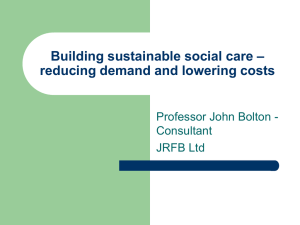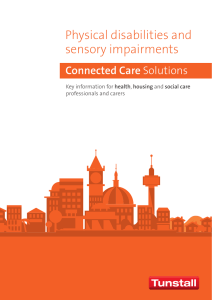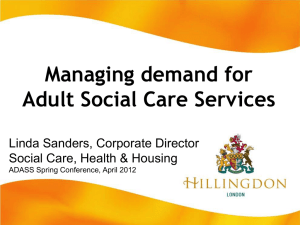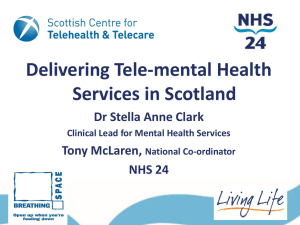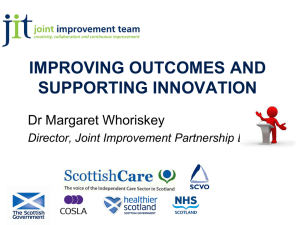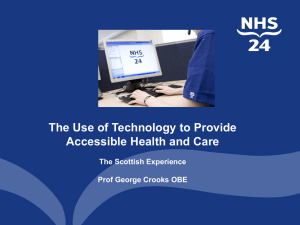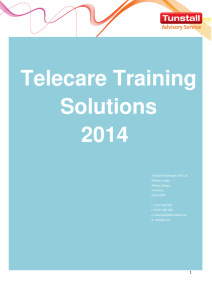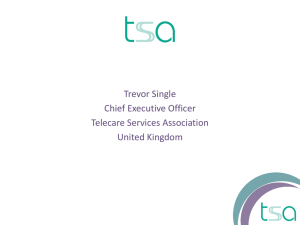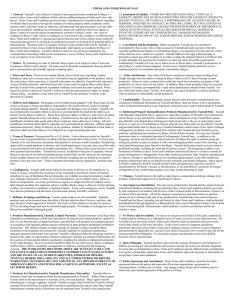Kevin Alderson
advertisement
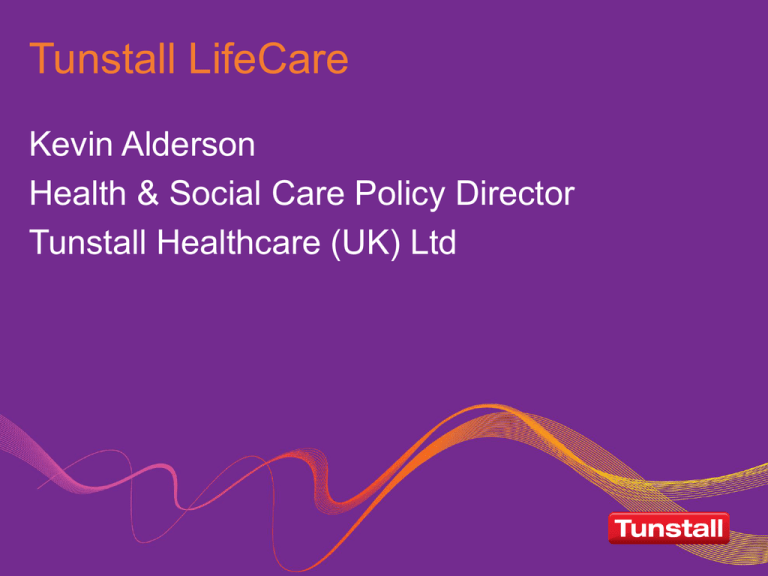
Tunstall LifeCare Kevin Alderson Health & Social Care Policy Director Tunstall Healthcare (UK) Ltd Pulling this together • Money!! • Transformation and personalisation – “The Case for Tomorrow Facing the Beyond” • • • • Demand Expectations Resources Services and the Market Telehealthcare at Scale Helps • Saves money and improves outcomes – Gives you more resources – “breathing space” • Opportunity for Health & Social Care to work more closely together – Encourages cooperation – Utilises existing local services • Excellent offer for the general public – Contributing directly to prevention Telehealthcare at Scale Helps NHS “LTC” Patients Need for Integrated Service Most expensive group General Public Non FACS eligible 80% - 90% ADASS Members (Statutory responsibility) Existing local service FACS eligible 10% – 20% Telehealthcare at Scale Helps • New evidence – Plus existing evidence!! • New approaches to making it happen – Tunstall LifeCare New Evidence from Hillingdon • Reduction in long-term residential and nursing care placements from 8.08 per week in 2010 to 3.57 per week to end Feb 2012. • Reduction of 112 OPS placements from October 2010. • Residential/nursing placement headcount at its lowest since April 2008. • Reablement with Telecare has led to steady reduction in homecare hours purchased of 10% from April 2011 to date, forecast continued year-on-year reduction of 7.8%. • 1120 TeleCareLine installations against a target of 750 for 2011/12. Investing to Save: Assessing the CostEffectiveness of Telecare • report by FACE Recording and Measurement Systems with the support of researchers at the British Psychological Society’s Centre for Outcomes, Research and Effectiveness, based at UCL • New report shows how widespread, targeted deployment of telecare could save – between £3m - £7.8m for a typical council – equating to 7.4% - 19.4% of the total older peoples’ social care budget The results – telecare NYCC 45% reduction in residential care costs 38% reduction in overall care costs 26% reduction in community support costs 95% of users said telecare had given them more confidence 95% of users said telecare helped them feel safer 87% of users said telecare had helped them to carry on living at home Summary of Other Evidence Number of cases reviewed % delayed admission to nursing/residential care Average delay of admission to care % with reduced home care Average reduction in home care Avoided emergency admissions (as % of users) Average saving per admission Wilts Norfolk Blackb urn/Da rwen Stockto n-onTees Nottin gham City Bristol Derbyshire East Mids CSED 423 29 114 253 105 199 1037 551 858 10% 38% 13% 28% 22% 25% 30% 16% 47% 13 weeks 32 weeks 13 weeks 52 weeks 4 weeks 13 weeks - - - 76% 28% 25% 8% - 30% 4% 11% 16% 1h p. wk 3.5h p. wk - 10.5h p. wk - 3.5h p. wk 2h p. wk - - 10% 10% - 46% - 23% - 20% 28% £ 775 £ 1,339 - £ 1,566 - £ 2,016 - - The results – WSD (telehealth) 45% reduction in mortality rates 20% reduction in emergency admissions 15% reduction in A&E visits 14% reduction in elective admissions 14% reduction in bed days 8% reduction in tariff costs “3 Million Lives” • A campaign to transform care for people living with LTCs where technology is appropriate • Borne out of the WSD programme, which makes the case for adoption at scale • A new way of working between government and industry, alongside the NHS family to overcome barriers and develop new business models • www.3millionlives.co.uk The solution Localised solution • Hillingdon – local services supported to grow and develop successfully • Nottinghamshire – partnership with Tunstall as lead contractor to deliver Telecare service across the County • Leicestershire – local monitoring and response service subcontracted to Tunstall as service provider Birmingham City Council Birmingham City Council has invested £14 million into a large-scale, city wide telecare service designed to benefit up to 25,000 people over three years. It is part of the Council’s new approach which is deploying resources at an early stage to support adults to stay in their own homes for longer, reducing the need for domiciliary and residential care. “Birmingham City Council’s pioneering decision to invest in telehealthcare to provide better quality and more efficient support and care to the people in our communities marks a significant milestone in how we are improving the lives of adults throughout the city. It is an accepted fact that the current system of delivering health and social care is simply unsustainable and innovations like telehealthcare are key to transforming services, helping us to achieve better for less.” Peter Hay, Strategic Director for Adults and Communities, Birmingham City Council and President of the Association of Directors of Adult Social Services TF3 – Northern Ireland TF3 is delivering a large-scale telehealth service in Northern Ireland. The service has capacity to support over 20,000 patients with long-term conditions helping to improve health outcomes through better engagement with clinicians and enhanced self-management. Over the next six years TF3 will provide a telemonitoring service to Northern Ireland (RTNI) which will support over 3,500 people a year, helping to reduce the pressure on frontline services by enabling people to be cared for in the community. “By using advanced technology in the right way, we enable patients and carers to monitor their condition at home, which leads to earlier intervention and reduces admissions to hospital. This is at the very heart of where our health service needs to go – we need to be more flexible, put the patient at the centre and ensure more people have the chance to stay at home with their families.” Edwin Poots, Minister of the Department of Health, Social Services and Public Safety, Northern Ireland Executive Tunstall LifeCare Tunstall LifeCare - Six Point Plan • • • • • • Business case Leadership plan Services “fit for purpose” Winning over the front line Partner plan Self funder plan Telehealthcare at Scale Helps Less social care demand Extra Income Less social care demand Extra Income General Public Non FACS eligible 80% - 90% NHS “LTC” Patients Need for Integrated Service Most expensive group Less social care demand Less money spent Existing local service FACS eligible 10% – 20% Telehealthcare at Scale Helps • Saves money and improves outcomes – Social Care and Health • Excellent catalyst for Health & Social Care to work more closely together – Encourages cooperation – Utilises existing local services efficiently • Excellent offer for the general public – Contributing directly to prevention Thank you – any questions??? Kevin Alderson kevin.alderson@tunstall.co.uk 07740 578000

